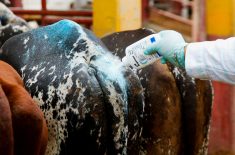A Quebec City-area rendering facility will get a federal loan for over $7.7 million to buy and install a boiler system fuelled by the least-wanted leftovers from slaughter cattle.
Sanimax ACI’s plant at Levis will get a repayable contribution of up to $7,742,954 through the federal Slaughter Waste Innovation Program for an “ultra-modern” biomass boiler in which it will dispose of specified risk materials (SRMs).
SRMs are the nervous-system tissues known to harbour the prions that cause bovine spongiform encephalopathy (BSE) in infected cattle.
In Canada, the tissues are banned from use in food, feed and fertilizer, creating headaches for slaughterhouses and rendering facilities that now must remove them for separate disposal.
Read Also

U.S. not ready to lift Mexican cattle ban over screwworm, Agriculture Secretary Rollins says
The U.S. is not yet ready to reopen its border to Mexican cattle amid an outbreak of the flesh-eating New World screwworm parasite, Agriculture Secretary Brooke Rollins said, but she is pleased with Mexico’s efforts to contain the pest.
The new boiler process, creating steam for heat, could replace nearly 30 per cent of the fossil fuel needs at Sanimax’s Levis plant, the government said in a release last week.
Thus rendered harmless, the SRMs’ ashes could also be marketed as fertilizer, the government said.
The funding for Sanimax is subject to signing of a contribution agreement. Projects funded under the program must be able to be completed by March 31, 2013.
The Slaughter Waste Innovation Program offers loans for equipment or research and development work on SRM handling, removal and disposal at slaughtering or rendering plants or through livestock industry associations.
Priority goes to projects that either lead to destruction of prions or maintain or create new SRM handling capacity.
Sanimax’s various operations in Canada include collecting animal and meat byproducts, hides and skins and used cooking oil, as well as food ingredient, feed, grain and leather processing. The company runs plants and sales offices in Ontario, Quebec and Manitoba.










